Everyone talks about the benefits of CBD. But, are there risks too? What kind of side effects can CBD cause? This article will look into CBD’s possible side effects. We’ll cover when you should worry and when to see a doctor. Discover the truth about CBD and its potential downsides.

Key Takeaways:
- CBD can cause side effects such as dry mouth, diarrhea, reduced appetite, drowsiness, and fatigue.
- It is essential to consult with a healthcare professional before using CBD, especially if you are taking other medications.
- CBD products are not regulated, so the quality and purity can vary. It is crucial to purchase from reputable sources.
- There is a potential risk of CBD interacting with certain medications, which may lead to increased side effects or reduced effectiveness.
- While CBD has potential benefits, it is not a cure-all and should not replace medical advice or treatment for serious conditions.
The Benefits and Safety of CBD
CBD, also known as cannabidiol, is popular for its health benefits. It’s approved by the FDA for certain types of epilepsy. However, its other benefits and safety need more study.
Research says CBD could control seizures, which helps people with epilepsy. But, we need more studies to see how it helps with other conditions.
“CBD has shown promise in reducing anxiety, relieving pain, and alleviating inflammation in some studies.”
CBD’s purity and dosage can vary widely. A study found some products had less CBD than their labels said. This shows the need to buy from trusted sources.
“**CBD oil side effects** may include dry mouth, diarrhea, reduced appetite, drowsiness, and fatigue, although these are generally well-tolerated.”
CBD might contain THC, marijuana’s psychoactive part. This can have unwanted effects for some.
Talking to a healthcare professional before using CBD is key. They can help with dosage and potential medication interactions.
With the right precautions, CBD use can be informed. So, you might enjoy its possible benefits safely.
The Potential Benefits of CBD
Studies hint at CBD’s possible benefits:
- Reducing anxiety and stress
- Relieving pain and inflammation
- Improving sleep quality
- Alleviating symptoms of certain neurological disorders
- Assisting in substance abuse treatment
CBD isn’t a miracle cure, and effects can vary. Always consult a healthcare pro for personalized advice before using CBD for health issues.
Common Side Effects of CBD
CBD has potential benefits, but we must also know about its side effects. Knowing these can help you choose wisely about CBD use.
Common side effects of CBD are:
- Dry mouth
- Diarrhea
- Reduced appetite
- Drowsiness
- Fatigue
Most people handle these side effects well, and they usually go away by themselves. Still, it’s good to watch how your body reacts to CBD. Everyone experiences these side effects differently.
Another important point is that CBD can affect how other medicines work. If you’re on medication, talk to a doctor before trying CBD. This helps avoid any harmful interactions.
| Side Effect | Severity | Frequency |
|---|---|---|
| Dry mouth | Mild | Common |
| Diarrhea | Mild | Less common |
| Reduced appetite | Mild | Less common |
| Drowsiness | Mild to moderate | Less common |
| Fatigue | Mild to moderate | Less common |
Note that these side effects are usually mild and go away quickly. Yet, if you get severe or lasting side effects, it’s best to seek medical help.
Next, let’s look at how CBD might interact with other drugs. This will help you know what precautions to take when using CBD with other medications.
CBD and Drug Interactions
It’s important to know that CBD can affect how some medications work. This includes blood thinners, antidepressants, anti-epileptic drugs, and even alcohol. These effects might lead to more side effects or make the medicines less effective.
Talking to a doctor about using CBD with other medicines is critical. This helps avoid unsafe interactions.
“CBD has the potential to interact with several medications metabolized by the same liver enzymes, which means that concurrent use could either increase toxicity or decrease effectiveness of these drugs.” – Nora D. Volkow, Director of the National Institute on Drug Abuse
CBD can change how your body processes certain medicines due to its impact on liver enzymes. This can change how well some drugs work. A healthcare professional can look at your medication list and suggest changes if needed.
By talking with a healthcare professional, you can use CBD and your medicines safely and effectively.
Common Medications That May Interact with CBD:
- Blood thinners (e.g., Warfarin)
- Antidepressants (e.g., SSRIs, MAOIs)
- Anti-epileptic drugs (e.g., Clobazam)
- Alcohol
These are just some examples of drugs that might not mix well with CBD. A healthcare professional can offer advice tailored to your medication list.
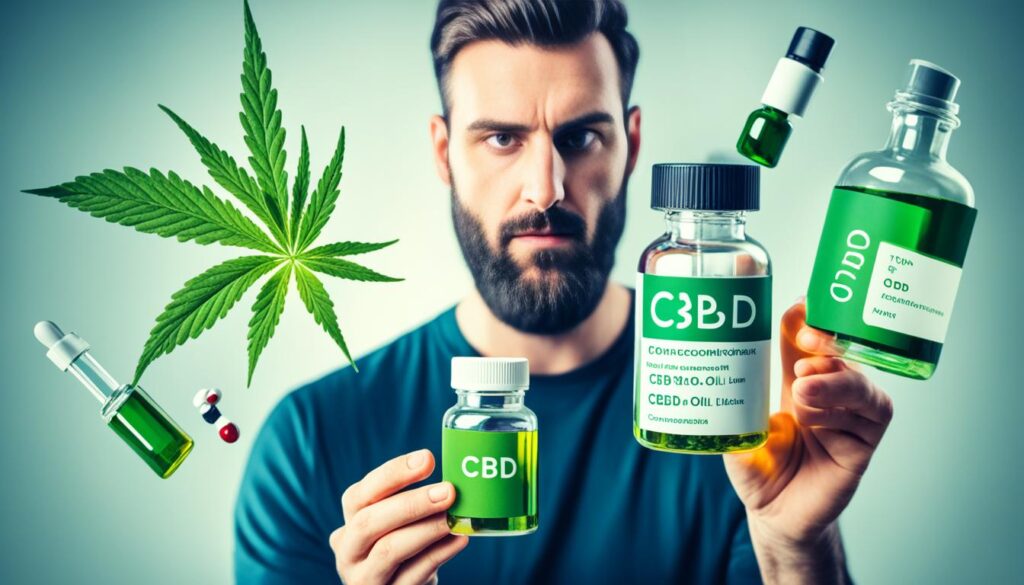
It’s key to manage potential drug interactions for safe medication use. Consulting a healthcare professional helps avoid risks and maximizes the benefits of CBD and your medicines.
Potential Risks of CBD Products
Using CBD products comes with risks. It’s important to know them. The CBD industry lacks the regulation you find with FDA-approved meds. This means there’s no strict quality control.
The quality and purity of CBD products can really vary. A study showed some products had less CBD than they said. Some even had THC, which is what gets you high. It’s tough for buyers to know what they are really getting.
To avoid risks, buy from trusted sources. Look for CBD products tested by third parties. Make sure the label shows the CBD and THC content, and other key info. Understanding these labels helps you choose good CBD products.
“The quality and purity of CBD products can vary greatly due to the lack of regulation in the industry. It’s important to purchase from reputable sources and carefully read labels to ensure you are getting a reliable product.” – Dr. Emily Johnson, CBD Expert
Potential Risks of Unreliable CBD Products
Unreliable CBD products can trick you. If the CBD level is lower than promised, it might not work well. You might need more than you thought, affecting your experience.
Products with wrong CBD levels make it hard to find your dose. Without reliable info, reaching your health goals can be hard. It leads to frustration.
THC in CBD products can cause unwanted effects. It can make you feel high, mess with your coordination, and speed up your heart. If you want to avoid THC, you must be careful.
Evaluating CBD Product Quality and Purity
When checking CBD products, consider a few things:
- Choose CBD from organically grown hemp to avoid harmful chemicals.
- Seek products with third-party lab tests. This confirms their CBD and THC levels are correct.
- Reliable CBD products have detailed labels. They tell you how much CBD and THC they contain, the serving size, and extra ingredients.
- Look at customer reviews and the brand’s reputation before buying. It gives you a sense of what others think and the brand’s trustworthiness.
Evaluating CBD products wisely helps you avoid bad ones. You can make choices that meet your needs.
Comparison of CBD Product Quality
| Criteria | High-Quality CBD Product | Unreliable CBD Product |
|---|---|---|
| Source of Hemp | Organically grown hemp with minimal pesticide use | Source of hemp is unclear or may involve the use of pesticides and other harmful chemicals |
| Third-Party Lab Testing | Undergoes rigorous third-party testing to ensure accurate CBD content, THC levels, and purity | No third-party testing or lack of transparency regarding testing results |
| Label Information | Clear and detailed labels with accurate CBD content, THC levels (if any), and serving size information | Inaccurate or insufficient label information, making it challenging to determine CBD content and proper dosage |
| Consumer Reviews and Brand Reputation | Positive consumer reviews and a reputable brand with a track record of quality and customer satisfaction | Negative reviews or a lack of information about the brand’s reputation and product quality |
Choosing high-quality CBD products from trustworthy sources is important. By knowing the risks and checking the quality and purity of CBD products, you can choose wisely. This helps you stay safe and meet your wellness goals.
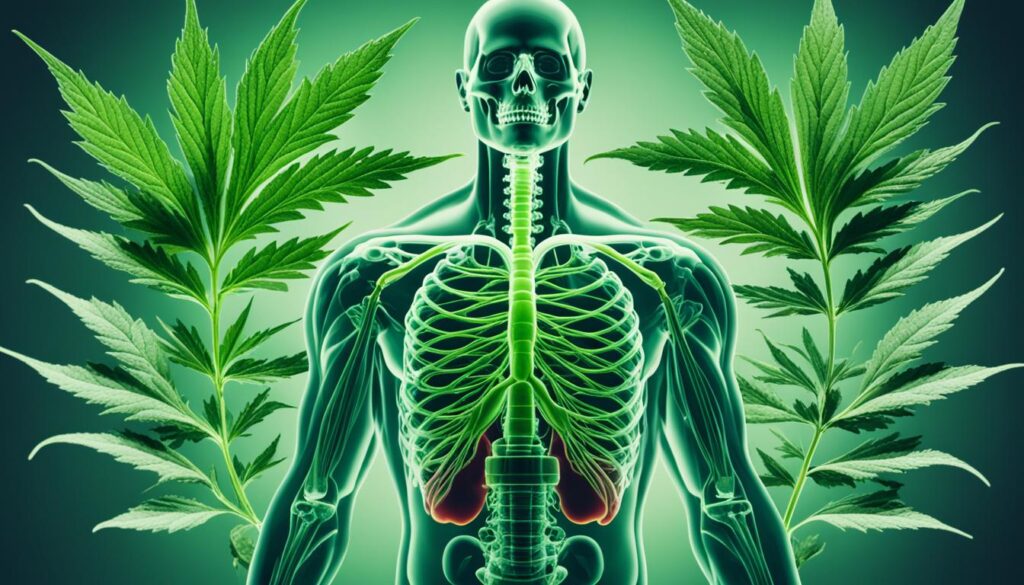
CBD and Liver Damage
CBD has potential benefits but also comes with risks, such as liver damage. The FDA has warned about liver issues from CBD, after research on a seizure medication showed dangers. This medication, derived from CBD, was linked with higher liver enzyme levels. High liver enzymes can indicate liver harm.
Though CBD’s liver damage risk is low, caution is still necessary. This is especially true for those with liver problems or on liver-impacting drugs. Talking to a healthcare provider before trying CBD is advised. They can help evaluate your specific risks and see if CBD is okay for you.
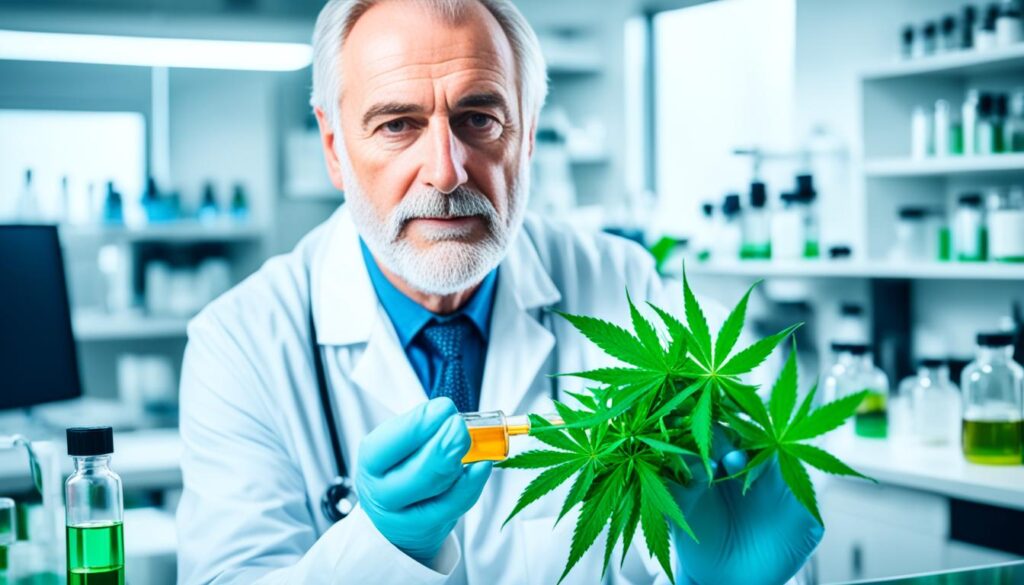
CBD Dosage and Administration
Finding the right CBD dosage is key to getting good results. The perfect amount can change based on the product and how it’s used. The FDA has only set dosages for one CBD medication for seizures. There are no set dosages for other CBD items yet.
Finding your perfect CBD amount often means looking at your needs. Things like what you’re treating and your weight matter. For example, chronic pain might need more CBD than general health needs.
It’s smart to start with a small amount of CBD and slowly up it. This helps you see how you react to it. Talking to a healthcare pro can help you figure out the best dose for you. They can consider your health needs for the best advice.
Methods of CBD Administration
CBD comes in many forms and can be taken in different ways. Each way of taking it has a different bioavailability. This means how much and how fast CBD gets into your blood.
- Oral Ingestion: You can take CBD by mouth using capsules, gummies, or oils. This slow-effect method goes through your digestive system but lasts longer.
- Sublingual: For faster effects, you can put CBD tinctures or sprays under your tongue. This way, it gets into your blood quickly.
- Topical Application: You can put CBD lotions or creams on your skin. This targets specific areas but can also get into your blood.
- Inhalation: Inhaling CBD through vaping or smoking gives quick results. It goes right to your lungs and then your blood, providing fast relief.
Choosing how to take CBD is about what you prefer and need. Think about how quickly you want it to work and what’s easy for you.
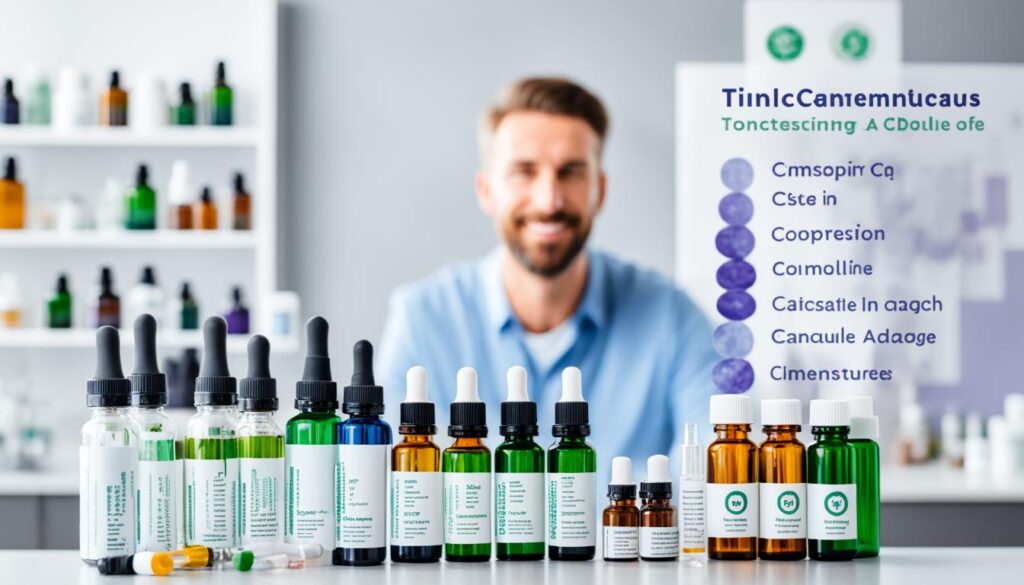
| Method of Administration | Bioavailability | Onset of Effects | Duration of Effects |
|---|---|---|---|
| Oral Ingestion | Low to moderate | 30 minutes to 2 hours | Up to 8 hours |
| Sublingual | Moderate to high | 15 minutes to 45 minutes | 4 to 6 hours |
| Topical Application | Low to moderate | Varies | Varies |
| Inhalation | High | Immediate | 2 to 3 hours |
Understanding the ways to take CBD and how they work helps you make a smart choice. It’s about what you want and what works for you.
CBD Benefits and Potential Uses
More research is needed to fully understand CBD’s benefits. Some studies show it might have positive health effects. Here are some ways CBD could be used:
1. Pain Relief
CBD might help lessen pain related to arthritis and chronic conditions. Studies suggest it affects the body’s pain receptors. This could ease pain symptoms.
2. Anxiety and Stress Relief
Many use CBD for anxiety and stress relief. It may have anti-anxiety effects and promote calm. It could help those with generalized or social anxiety disorder.
3. Anti-Inflammatory Effects
Inflammation is linked to many chronic health issues. CBD may lower inflammation and ease symptoms. It seems helpful for autoimmune disorders and certain types of pain.
4. Epilepsy Treatment
CBD is known for treating certain types of epilepsy. The FDA approved a CBD-based drug for two severe forms. It may reduce seizures in these conditions.
5. Potential Antioxidant Effects
CBD may also work as an antioxidant. This could benefit overall health and prevent diseases. Antioxidants guard against damage by free radicals and oxidative stress.
It’s key to remember CBD isn’t a cure-all for serious conditions like cancer. While potentially beneficial, use it as part of a full treatment plan and under medical guidance.
CBD appears promising in several health areas. Always talk to a healthcare professional before trying CBD. This ensures safe and effective use, especially with underlying conditions or other medications.
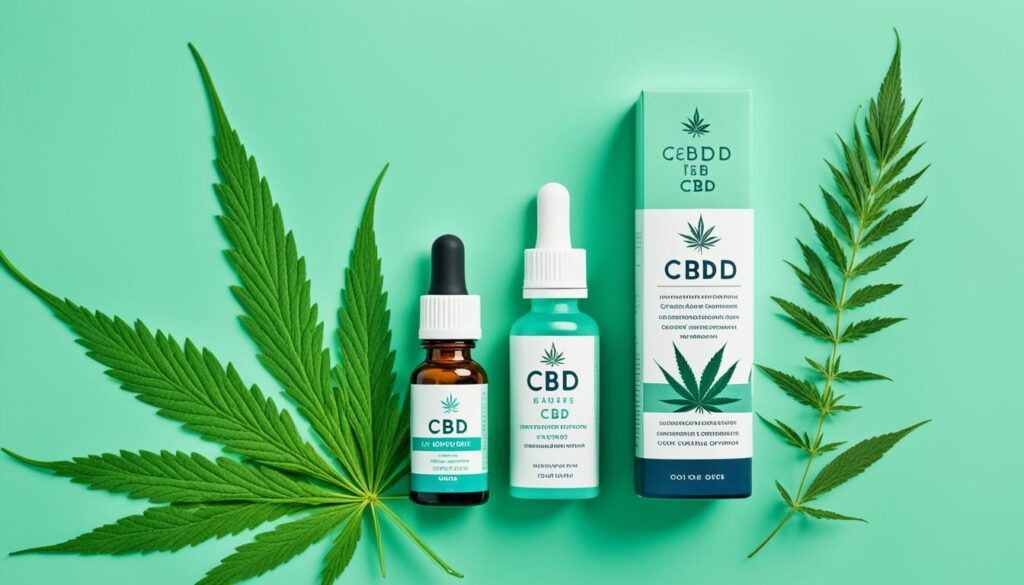
CBD Safety Considerations
While CBD is often seen as safe, you should know some things for safety. The quality and safety of CBD products can vary a lot. This is why buying CBD from well-known, quality-focused places is vital.
One big worry with CBD is how it might interact with other medicines. It can change how your body processes many drugs. This could lead to more side effects or less effect. Always talk to a doctor before you start using CBD if you’re on medication.
People with health issues should also be careful with CBD. Though we need more research, CBD could affect conditions like liver disease. If you have health problems, talk to your doctor before using CBD.
Remember, CBD doesn’t work the same for everyone. What helps one person might not help another. The best dose and how to take it differ for everyone. It depends on your weight, how your body processes things, and your health issues.
Finally, keeping up with CBD safety information is key. Since research is always finding new things, stay updated. Always check reliable sources for the latest safety tips.
Key Safety Points:
- Choose CBD products from reputable sources
- Consult with a healthcare professional if you are taking medications
- Exercise caution if you have underlying health conditions
- Individualize CBD dosage and administration based on your needs
- Stay informed about CBD safety through reliable sources
| Potential Risks | Safety Measures |
|---|---|
| Possible interactions with medications | Consult with a healthcare professional |
| Quality variation in CBD products | Purchase from reputable sources |
| Potential interactions with underlying health conditions | Discuss CBD usage with a healthcare professional |
Remember, your safety with CBD is very important. Always be cautious and consult a doctor to make safe choices about CBD.

Conclusion
CBD can lead to side effects like dry mouth, diarrhea, and feeling tired. It’s important to know these side effects if you’re thinking about using CBD. Also, talking to a doctor before trying CBD, especially if you’re on other meds, is key. CBD could help with certain conditions, but picking high-quality products matters.
When looking into CBD, safety and effectiveness should be your top concerns. Since CBD isn’t strictly regulated, the quality and dose might not be accurate. To stay safe, buy CBD from trusted sources. These sources should offer lab reports to prove their CBD is what it claims to be.
While CBD can be beneficial, using it cautiously is critical. Always seek advice from a healthcare professional. This way, you’ll make choices about CBD that are good for your health. You’ll also reduce the chances of side effects and problems with other meds.